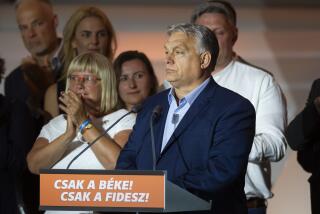Hungary Says Reform Is Faster Than Scheduled : Economy: The East European nation says its currency will be convertible within a year. It earlier set a target of early 1993.
- Share via
BUDAPEST, Hungary — Finance Minister Mihaly Kupa predicted Friday that the Hungarian forint will be convertible within a year, underscoring Hungary’s newfound optimism about its economic future.
Kupa and other finance officials in the year-old center-right government had previously said convertibility--a major milestone in the transition to a market economy--could not be achieved before early 1993.
At a press conference with Prime Minister Jozsef Antall to review the government’s first year in office, Kupa moved up the target by more than six months, saying: “We envision the convertibility of the national currency within a year. We acknowledge that 1991 will be a very difficult year, but we see some positive signs emerging and hope to be able to speak more about them in the second half of the year.”
Hungarian and Western economists have uniformly predicted that this year will be the turning point in Hungary’s transition from a centrally planned socialist economy to one driven by market forces.
Privatization of state-owned businesses has been slow--especially for the most antiquated industries that produced goods for the Soviet Bloc--and cannot meet the more demanding standards of Western buyers.
But the booming private sector is gradually drawing workers from the doomed factories, a development that has held unemployment to a manageable 3%.
Inflation has leveled off at an annual rate of about 32% over the past few months, somewhat short of the 40% peak economists had predicted once all subsidies had been removed from consumer goods.
Despite expectations of a sharp decline in foreign trade and hard-currency earnings, Hungary has steadily amassed a current-accounts surplus that exceeded $200 million by April’s end.
Trade with the Soviet Union has virtually collapsed since a Jan. 1 switch to dollar-based accounting. But Hungary has greatly outdistanced the other new democracies of Eastern Europe in reorienting production and exports for Western markets.
A 6% drop in gross national product was forecast for 1991. But some economists now believe that the shrinkage will be closer to 4%.
Kupa acknowledged that major transitional tasks remain, such as creating jobs for those who will be laid off later this year, improving state-funded health care and ensuring continued benefits to pensioners who account for nearly a fifth of Hungary’s 10 million citizens.
But his forecast of a convertible forint by mid-1992 marked a change in attitude among the traditionally gloomy ministers of the Antall government.
Hungary will likely have to secure foreign credits of $2 billion to finance convertibility. Kupa believes that support will be forthcoming from the International Monetary Fund because the country has proven itself a trustworthy debtor.
More to Read
Sign up for Essential California
The most important California stories and recommendations in your inbox every morning.
You may occasionally receive promotional content from the Los Angeles Times.











